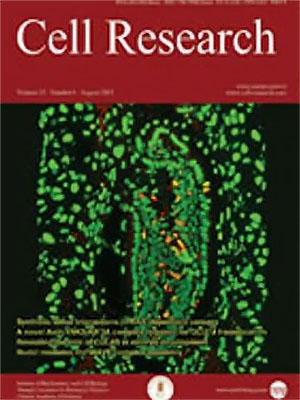
Volume 11, No 2, Jun 2001
ISSN: 1001-0602
EISSN: 1748-7838 2018
impact factor 17.848*
(Clarivate Analytics, 2019)
Volume 11 Issue 2, June 2001: 135-141
ORIGINAL ARTICLES
Maternal zinc deficiency impairs brain nestin expression in prenatal and postnatal mice
WANG Fu Di1,2, Wei BIAN1, Ling Wei KONG1, Fa Ji ZHAO2, Jun Sheng GUO2, Nai He JING1,*
1Institute of Biochemistry and Cell Biology, Shanghai Institutes for Biological Sciences, Chinese Academy of Sciences, 320 Yue Yang Road, Shanghai 200031, China
2Department of Public Health, Second Military Medical University, Shanghai 200433, China
Correspondence:
Effects of maternal dietary zinc deficiency on prenatal and postnatal brain development were investigated in ICR strain mice. From d 1 of pregnancy (E0) until postnatal d 20 (P20), maternal mice were fed experimental diets that contained 1 mg Zn/kg/day (severe zinc deficient, SZD), 5 mg Zn/kg/day (marginal zinc deficient, MZD), 30 mg Zn/kg/day (zinc adequately supplied, ZA) or 100 mg Zn/kg/day (zinc supplemented, ZS and pair-fed, PF). Brains of offspring from these dietary groups were examined at various developmental stages for expression of nestin, an intermediate filament protein found in neural stem cells and young neurons. Immunocytochemistry showed nestin expression in neural tube 10.5 d post citrus (dpc) as well as in the cerebral cortex and neural tube from 10.5 dpc to postnatal d 10 (P10). Nestin immunoreactivities in both brain and neural tube of those zinc-supplemented control groups (ZA, ZS, PF) were stronger than those in zinc-deficient groups (SZD and MZD). Western blot analysis confirmed that nestin levels in pooled brain extracts from each of the zinc-supplemented groups (ZA, ZS, PF) were much higher than those from the zinc-deficient groups (SZD and MZD) from 10.5 dpc to P10. Immunostaining and Western blots showed no detectable nestin in any of the experimental and control group brains after P20. These observations of an association between maternal zinc deficiency and decreased nestin protein levels in brains of offspring suggest that zinc deficiency suppresses development of neural stem cells, an effect which may lead to neuroanatomical and behavioral abnormalities in adults.
FULL TEXT | PDF
Browse 2668


